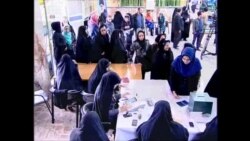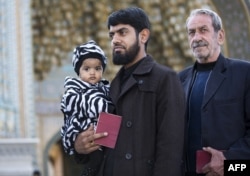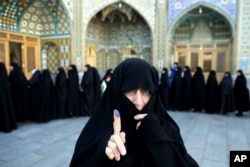ຜົນການນັບຄະແນນສຽງຂັ້ນຕົ້ນຂອງການເລືອກຕັ້ງສະພາຢູ່ອີ
ຣ່ານ ໃນວັນເສົາມື້ນີ້ ສະແດງໃຫ້ເຫັນວ່າ ອີຣ່ານເບິ່ງຄືວ່າພວມ
ເລີ້ມຕົ້ນຍຸກສະໄໝໃໝ່ ທີ່ພວກປະຕິຮູບ ແລະ ພວກນິຍົມແນວ
ທາງເດີມລະດັບປານກາງ ກຳລັງສ້າງແນວທາງຮ່ວມກັນ ໃຫ້ປະ
ທານາທິບໍດີ Hassan Rouhani ດຳເນີນແຜນການ ທາງດ້ານ
ການເມືອງຂອງທ່ານ. ການປ່ອນບັດ ເລືອກເອົາ ສະມາຊິກສະ
ພາດັ່ງກ່າວແມ່ນການເລືອກຕັ້ງແຫ່ງຊາດເທື່ອທຳອິດນັບແຕ່ໄດ້ມີການຕົກລົງຄັ້ງປະຫວັດ ສາດກ່ຽວກັບເລື້ອງນິວເຄລຍກັບບັນດາປະເທດມະຫາອຳນາດຂອງໂລກມີຜົນບັງຄັບໃຊ້.
ຜົນການນັບບັດຄະແນນສຽງຂັ້ນສຸດທ້າຍ ໃນການປ່ອນບັດມື້ວານນີ້ອາດໃຫ້ຮ່ອງຮອຍອັນ
ທຳອິດກ່ຽວກັບວ່າຂໍ້ສະເໜີທີ່ສຳຄັນໃນການຕົກລົງຂອງບັນດາປະເທດຕາເວັນຕົກຈະໄດ້
ຮັບໃນອັນທີ່ພວກເຂົາເຈົ້າຫວັງໄວ້ນັ້ນກໍຄືປະເທດອີຣ່ານທີ່ເປີດກວ້າງແລະນິຍົມແນວທາງ
ປານກາງຫລາຍຂຶ້ນຫຼືບໍ່.
ໃນຂະນະທີ່ປະຊາຊົນຊາວອີຣ່ານພາກັນໄປປ່ອນບັດເລືອກເອົາສະມາຊິກສະພາຢູ່ນີ້ຜົນ
ຂອງການປ່ອນບັດດັ່ງກ່າວ ອາດຕີຄວາມໝາຍໄດ້ ເຖິງລະດັບໃນການໃຫ້ຄວາມສະໜັບ
ສະໜູນຕໍ່ນະໂຍບາຍ ປະທານາທິບໍດີ Hassan Rouhani ທີ່ຈະປະເຊີນກັບການເລືອກ
ຕັ້ງເຂົ້າຮັບຕຳແໜ່ງຕື່ມອີກໃນປີໜ້ານີ້. ທ່ານ Rouhani ຖືເອົາຂໍ້ຕົກລົງນິວເຄລຍເປັນຈຸດ
ປະສົງຫຼັກສຳລັບລັດຖະບານຂອງທ່ານ.
ການປ່ອນບັດມີກຳນົດທີີ່ຈະປິດລົງໃນເວລາ 6 ໂມງແລງຕາມເວລາໃນທ້ອງຖິ່ນແຕ່ປາກົດ
ວ່າຍັງພາກັນເປີດຢູ່ຕໍ່ມາ ໃນບາງເຂດ. ໂທລະພາບຂອງທາງການສະແດງໃຫ້ເຫັນວ່າ ມີຜູ້
ເຂົ້າແຖວຍາວຢຽດເພື່ອລໍຖ້າປ່ອນບັດທັງຢູ່ທີ່ນະຄອນຫຼວງເຕຫະຣ່ານແລະໜ່ວຍບັດແຫ່ງ
ອື່ນໆໃນທົ່ວປະເທດ.
ປະຊາຊົນຊາວອີຣ່ານ ປະມານ 55 ລ້ານຄົນ ໄດ້ຈົດທະບຽນ ທີ່ຈະໄປປ່ອນບັດເລືອກເອົາ
ສະມາຊິກສະພາແຫ່ງຊາດທີ່ຄອບງຳໂດຍພວກນິຍົມແນວທາງເດີມຊຶ່ງມີບ່ອນນັ່ງທັງໝົດ
290 ບ່ອນ ແລະ ສະມາຊິກສະພາຜູ້ຊ່ຽວຊານ ດ້ານສາສະໜາ ທີ່ປະກອບດ້ວຍ 88 ຄົນ. ສະພາດັ່ງກ່າວ ແມ່ນມີໜ້າທີ່ຕິດຕາມເບິ່ງການເຮັດວຽກ ຂອງຜູ້ນຳສູງສຸດ Ayatolla Ali
Khamenei ແລະສະພານີ້ເປັນຜູ້ທີ ແຕ່ງຕັ້ງຜູ້ນຳສູງສຸດຂອງປະເທດ.
Early returns Saturday from Iran's parliamentary election indicate the country will likely usher in a new era with reformists and moderate conservatives creating a friendly venue for President Hassan Rouhani to pursue his political agenda. The vote for the lawmakers was the first election since the country's nuclear deal with world powers took effect.
The final results of Friday's vote may provide the first clue as to whether key Western proponents of the deal will receive what they hoped for; a more open, moderate Iran.
While Iranians were voting for lawmakers, the outcome of the vote could be interpreted as a comment on the level of support for the policies of Rouhani, who is up for re-election next year. Rouhani has made the nuclear agreement a key objective of his administration.
Polls had been scheduled to close at 6:00 p.m., but remained open later; much later, in some cases. State television showed long lines both in Tehran and in polling places around the country.
Some 55 million Iranians were registered to cast ballots for members of the conservative-dominated 290-seat parliament as well as the 88-member Assembly of Experts. The Assembly monitors the work of Supreme Leader Ayatollah Ali Khamenei, who has final say on Iran's foreign policy.
While Iranians were voting for lawmakers, the outcome of the vote could be interpreted as a comment on the level of support for the policies of President Hassan Rouhani, who is up for re-election next year. Rouhani has made the nuclear agreement a key objective of his administration.
Voting for future
Iranian State TV called Friday a “great day for the nation,” as citizens across the country turned out to vote for the country's parliament and the Guardian Council, which selects Iran's Supreme Leader.
State TV showed voters across Iran giving their reasons for their choices. A man with a young child said he was “voting for his children's future,” while an older woman said she wanted to “foil Iran's enemies, who are plotting against the country.”
A correspondent for Iran's Al Alam TV at a major Tehran polling station said turnout was “beyond expectations,” and that “long lines of voters had shown up,” to “express their support for their country and its Islamic system.”
Bani Sadr: voters 'apathetic'
Former Iranian president Abolhassan Bani Sadr, who lives in exile in Paris, disputed reports of long lines, telling VOA that voters were “apathetic” in many places.
He says that reports he had received from inside the country indicate that apart from several “showcase” polling stations in the capital, turnout at other places was often no more than several dozen people.
Political analyst Mohamed Ali Mirzani told the TV Iranian electors like to vote at odds to the way foreign countries want them to vote in order to quash threats posed from abroad. He said voters know their participation is important in deciding the fate of their country.









